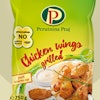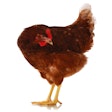Just one pet goose with H5N1 is all it takes to destroy poultry exports as Germany found to its cost in early July. Following a number of outbreaks in wild birds, the H5N1 virus was confirmed in a single free-range pet goose but that was enough to spark immediate export bans as far a field as Japan and South Africa.
Japan’s farm ministry suspended imports of day-old chicks, poultrymeat and eggs for processing. Germany is the third largest exporter of one-day old chicks to Japan. In 2006, Japan imported 114,250 day-old chicks from Germany together with 9 tonnes of poultrymeat and 1,019t of eggs for processing. The ban will last for at least 90 days.
South Africa followed with an embargo on the import of all live birds, poultrymeat and other poultry products until further notice. Poultry products subjected to processing techniques that comply with international requirements to ensure inactivation of the avian influenza virus are excluded. En-route consignments will be impounded at ports of entry and veterinary import permits have been cancelled.
Though already facing endemic H5N1 in village poultry, Egypt slapped bans on poultry imports from Germany (and France). The import of birds and poultry of any age from Germany or France is banned, said Cairo airport’s veterinary authority in a statement made to airlines.
















